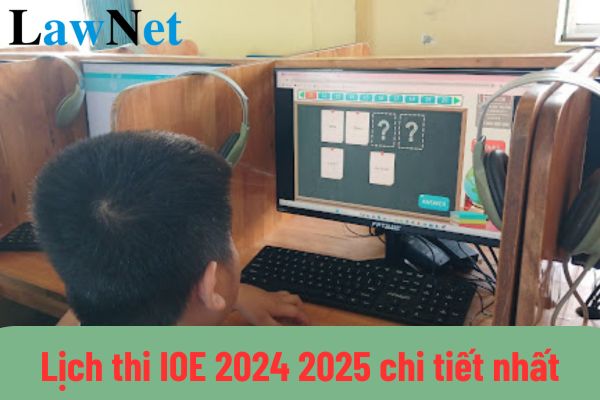What are details of the schedule of IOE exam in the 2024 - 2025 academic year in Vietnam? What are the ages of students at each level in Vietnam?
What are details of the schedule of IOE exam in the 2024 - 2025 academic year in Vietnam?
The IOE (Internet Olympiad of English) is an online English language competition for students from primary to upper secondary school nationwide. IOE is a beneficial English playground, providing equal access to English and Information Technology for all students, helping them from grade 3 to grade 12 across the country to hone and practice listening, speaking, reading, and writing skills easily.
The Self-Practice and Official Competition rounds of IOE for the school year 2024-2025 officially open from August 15, 2024, to May 5, 2025. The IOE exams are designed to be intuitive and diverse with a smart approach, helping to form English learning habits for students.
|
Schedule of IOE exam in the 2024 - 2025 academic year Some highlights of the schedule are as follows: |
Refer to the detailed exam schedule download

What are details of the schedule of IOE exam in the 2024 - 2025 academic year in Vietnam? What are the ages of students at each level in Vietnam? (Image from the Internet)
What are the ages of students at each level in Vietnam?
According to Article 28 of the Education Law 2019, the age ranges for students at each level are as follows:
Levels of education and ages in general education
1. The levels and ages in general education are stipulated as follows:
a) Primary education is implemented over 5 school years, from grade one to grade five. The age for students entering grade one is 6 years, calculated by year;
b) Lower secondary education is implemented over 4 school years, from grade six to grade nine. Students entering grade six must have completed the primary education program. The age for students entering grade six is 11 years, calculated by year;
c) Upper secondary education is implemented over 3 school years, from grade ten to grade twelve. Students entering grade ten must have a secondary school graduation certificate. The age for students entering grade ten is 15 years, calculated by year.
2. Cases where students are allowed to skip grades, or study at an age higher than the stipulated age in clause 1 of this Article include:
a) Students skipping grades due to early intellectual development;
...
Thus, based on the above regulations:
- The age range for primary school students (grades 1 to 5) is 6 to 10 years old.
- The age range for lower secondary school students (grades 6 to 9) is 11 to 14 years old.
- The age range for upper secondary school students (grades 10 to 12) is 15 to 17 years old.
*Note: The age ranges do not apply to students who skip grades due to early intellectual development.
What are the objectives of the educational program at each level?
According to Article 29 of the Education Law 2019, the objectives of the educational program at each level are stipulated as follows:
- General education aims to comprehensively develop learners in morality, intelligence, physique, aesthetics, and basic skills; to develop personal capacities, dynamism, and creativity; to shape the socialist Vietnamese human character and citizenship responsibility; to prepare learners for continuing higher education, vocational education, or participating in labor, building, and defending the Fatherland.
- Primary education aims to establish the initial foundation for the development of students' morality, intelligence, physique, aesthetics, and capacities; to prepare students to continue Lower secondary education.
- Lower secondary education aims to consolidate and develop the results of primary education; to ensure students have basic general education, essential technical knowledge, and vocational orientation to continue to upper secondary school or vocational education programs.
- Upper secondary education aims to provide civic knowledge; to ensure students consolidate, develop Lower secondary education results, complete general education, and have basic technical and vocational knowledge; to create conditions for personal capacity development to choose a developmental direction, continue higher education, vocational education, or participate in labor, building, and defending the Fatherland.

